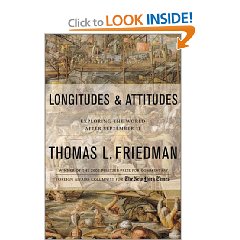Across many columns, the author hits again and again at the basics: “we have been allowing a double game to go on with our Middle East allies for years, and that has to stop.” Either they cease supporting terrorists in return for a dubious poverty-ridden peace at home, or they join the target list; we must invest heavily in both a Marshall Plan and a Voice of America *in Arabic* that consistently and constantly counters all of the lies about America and against America that the Arab regimes permit as part of their strategy for peace at home; lastly, more subtly, we must get serious about standing up for our values and not allowing rogue governments to abuse our friendship and tolerance while fostering hatred of America among their repressed, using America as the opiate of the down-trodden. The author seems to agree with Ralph Peters, author of “Beyond Terror” and “Fighting for the Future” in focusing on the importance of the Muslim outlands from Pakistan and India down through Malaysia and Indonesia, and he is especially strong at documenting the severe misunderstandings and misimpressions of America that persist across the Muslim world but especially in Arabia–otherwise serious people who really believe that bin Laden is good, 9-11 was justified, and everything will get better if America stops supporting Israel.
This particular book, down to earth and based on very direct observations, is a useful counter-balance to Bernard Lewis, “What Went Wrong.” Both distinguished authors agree that the Arab regimes are their own worst enemies and have brought their poverty on themselves–but where the historian seems to deem this sufficient to permit disengagement, the correspondent takes the other tack and calls for major generational-changing engagement, utilizing all the instruments of national power, from coercive diplomacy backed up by the very real threat of military intervention amongst our pupported allies, to massive economic, educational, and cultural assistance and outreach.
Toward the end of the book, quoting the deputy editor of New Isvestia in Moscow, the author hits the final nail on the head: “It is not East versus West anymore. It is the stable versus unstable worlds…”
China, Russia, Islam, water, disease, crime–terrorism, I conclude, is a very small part of the threat, and our greatest challenge right now is to devise a holistic national security strategy that does not lose sight of the forest for the one burning bush. Overall, the author has provided as fine a net assessment as any President could ask for.





